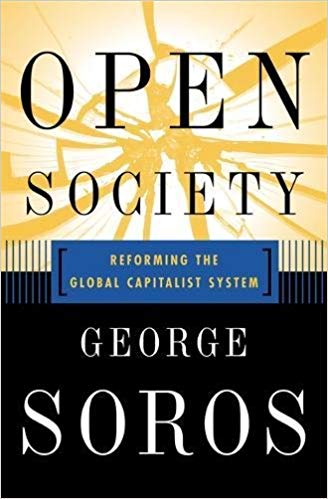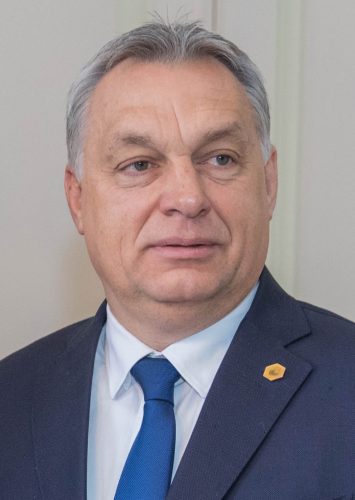Culture Watch: George Soros — Foe of Illiberal Democracy
Now George Soros is mostly known as favored target of the right, more onerous to it, it seems, than even — Lock Her Up! — Hillary Clinton.

George Soros — an extraordinary life story. What’s Spielberg waiting for? Photo: Wiki Commons
By Harvey Blume
When I interviewed George Soros in 2006, regarding his then most recent and reflective book, The Age of Fallibility: Consequences of the War on Terror, he was still seen first and foremost as a brilliant financier who knew how to parse and prick bubbles so as to draw maximum profit out of them. He was most famous for betting against — shorting — the English pound when he thought it was vastly overvalued.
You make enemies when you outsmart the market as he had a knack for doing but nothing like the murderous rancor his name now arouses among some.
In addition, Soros was known as something of a thinker, a ruminator, with wisdom about the ties between open markets and open societies as he had learned to conceive these subjects when studying with Karl Popper — author of The Open Society and Its Enemies — in England.
And then there’s Soros’s extraordinary life story — what’s Spielberg waiting for? George Soros, as a boy, eluded the Nazis when they invaded Hungary, and then the Communists when they took power, winding up in England where he studied philosophy.
It did not at one time hurt his reputation that through his Open Society Foundation he contributed billions to causes such as the opposition to Communism, to G.W. Bush’s invasion of Iraq and, more lately, to the ongoing shut down of civil liberties in Russia and Hungary.
Worthy causes, most might have once agreed. But then comes the geopolitical sea change.
Now Soros is mostly known as favored target of the right, more onerous to it, it seems, than even — Lock Her Up! — Hillary Clinton. What the creatures of the right would do to a Soros if they could goes beyond lockup. Rudolf Giuliani, for one, ludicrously pegged Soros as not merely another wealthy liberal gadfly but as nothing less than the anti-Christ. Which would be funny except it isn’t. And back across the world to Hungary, where Soros began, Victor Orban, its new autocrat, hopes to bring about what he calls illiberal democracy — the antithesis of everything Soros has stood for. Not too surprisingly Orban treats Soros as if he were nothing less than all the Zionist elders, as described in that infamous forgery, the Protocols, rolled up into one.
One of the strengths of anti-Semitism is its simplicity: its way of explaing all the things you oppose or don’t understand to one fantastic rubric. Right now Soros has ceased to be anything like the benevolent billionaire we once knew him to be: he is the Jew behind it all, he is that very Jew.
 This interview first appeared in the Boston Globe
This interview first appeared in the Boston Globe
“I GOT LOST in philosophical abstractions,” writes 75-year-old billionaire philanthropist George Soros, about his attempt, decades ago, to compose a philosophical treatise. “I decided to quit and devote myself to making money.”
That Soros succeeded in the latter endeavor–making a fortune in financial markets–is common knowledge. But readers of his new book, The Age of Fallibility: Consequences of the War on Terror will discover quickly that he never abandoned philosophy. If you have a taste for such things, you will almost certainly be impressed, for example, by his deft juxtaposition, in a single paragraph, of Leo Strauss, guru of the neoconservatives, and Karl Popper, a social theorist whose profound impact on Soros can’t be overstated.
In fact, much of Soros’s philosophizing is spurred on by his desire to hone ideas that so impressed him, when, as a young man fleeing Communist Hungary after World War II, he studied under Popper at the London School of Economics. Before the Communists took over, Soros’s Jewish family survived the Nazi occupation of Hungary. Popper’s writings — especially his 1945 book, The Open Society and Its Enemies — gave Soros an enduring framework for understanding totalitarian regimes.
According to Soros, the surest way to grasp the meaning of an open society is to come to one from a closed society–the difference hits you in a flash. But he does offer hints for those without that experience. “In my definition,” he writes, “an open society is an imperfect society that holds itself open to improvement.”
Imperfection is a keynote for Soros. In human affairs, he says, people are simultaneously observers and players, which makes objectivity impossible and error inevitable. In a sense, philosophy and finance have converged for him.
Soros: His analyses of how investors’ expectations shape financial bubbles and boom-bust cycles helped him make his fortune.
The new book is a passionate plea for us to accept our fallibility. The alternative–whether expressed in political dogma or religious fundamentalism–makes for a closed society. Soros thinks that America–the world’s exemplary open society, in his view–shows worrisome signs of closing under the current administration, which led him to spend a lot of money trying to defeat George W. Bush in the last election. That, along with other controversial interventions (support of needle exchange programs in New York and the legalization of marijuana, to name two) by his Open Society Institute, have made him the billionaire philosopher the right-wing most loves to hate.
Blume: Do you see yourself as an unusually reasonable person?
Soros: Yes, though I see that our grasp of reality is fundamentally flawed. Given that we are observers and participants at the same time, we can never reach ultimate truth.
So I don’t have faith in reason. I have faith in critical thinking. That’s why I believe in democracy–so that governments can be changed if they don’t perform–and in market economies, to give us feedback so we can correct our mistakes.
Blume: You seem apologetic about the philosophical section of “The Age of Fallibility.” Why?
Soros: Because of how little the general public here is interested in philosophy. It’s amazing that in China, people really respond; the philosophical discussion is really important to Chinese intellectuals. American intellectuals tend to skip it.
Blume: Are you unique in being a billionaire whose philanthropy consists of pinpoint political interventions? Are there other versions of you–right-wing versions?
Soros: There are several billionaires who have devoted considerable amounts of money to political purposes using philanthropic drives. Richard Mellon Scaife, for example, is a Pittsburgh billionaire who devoted large amounts of money to persecuting the Clintons, and is doing the same, though possibly not with the same amount of money, to me.
Blume: There are times in the book when it seems you are opposed to the global economy and to what is often called globalization. Is that so?
Soros: No. I’m not opposed to globalization. But I consider the current form of globalization flawed. It’s flawed because we have global markets but don’t have political institutions to match.
People who believe in what I call market fundamentalism think that the common good is best served by everybody pursuing their own self interest. This thesis happens to be false, because there are common interests that are not taken care of by markets. You need separate institutions to take care of common interests in a national economy. Now we need them in an international economy.
Blume: Do you favor some sort of global government?
Soros: I’m against global government. Now [laughing] if you don’t like a national government, you can move someplace else. A global government would probably interfere with our freedom more than national governments.
But you do need international law and international institutions, and today, international law is very weak. The American supremacists argue that international relations are relations of power, and that international law merely recognizes what power has wrought.
Blume: You attribute that view to Dick Cheney and Donald Rumsfeld, and say that they have “successfully manipulated a born-again president and a feel-good public.”

Viktor Orbán — Hungarian autocrat. Wiki Commons.
Soros: They gave President Bush very bad advice, and it has turned out badly.
Blume: Do you think they see the invasion of Iraq as a failure?
Soros: Cheney and Rumsfeld continue to take a very anti-international approach and want to use force. They are actively agitating for military action against Iran, which has really terrified the uniformed military. There’s no question that they are disappointed that Iraq wasn’t easier, and so you’ll find neocons who have turned against that policy. But the hard core, Cheney and Rumsfeld, want to push on.
Blume: It’s hard to see the American people supporting a war with Iran.
Soros: The danger cannot be discounted. Iranian president Mahmoud Ahmadinejad has more influence than his predecessor in Iran, Mohammad Khatami. And here we have Cheney. Extremists on both sides are playing off each other, and the moderates are shut out by the escalation.
Blume: You have one thing in common with the right–the belief that American leadership is essential to the world.
Soros: If we want to be the leader of the free world, we have a unique responsibility not only to protect our relative advantages but to the common problems of humanity. Solutions to problems like global warming require cooperation. That cooperation cannot be successful without the United States. But for the right, American leadership is just military leadership.
Blume: You describe the war in Vietnam as an aberration from America’s fundamentally sound leadership style, and argue that the war on terror is much worse, nullifying our global leadership status.
Soros: It dismays me to come to that conclusion.
Blume: How do you defend against pessimism?
Soros: I am rather pessimistic. But I’m optimistic, too, because it’s possible to do something about it. We are a democracy, and can correct our mistakes. We can change our policy. We still are an open society. That makes me hopeful.
Harvey Blume is an author—Ota Benga: The Pygmy At The Zoo—who has published essays, reviews, and interviews widely, in The New York Times, Boston Globe, Agni, The American Prospect, and The Forward, among other venues. His blog in progress, which will archive that material and be a platform for new, is here. He contributes regularly to The Arts Fuse, and wants to help it continue to grow into a critical voice to be reckoned with.

